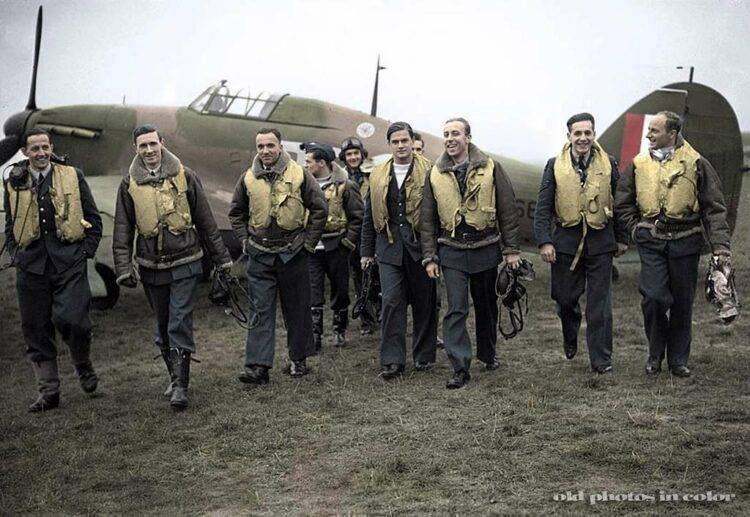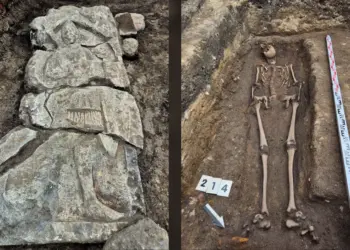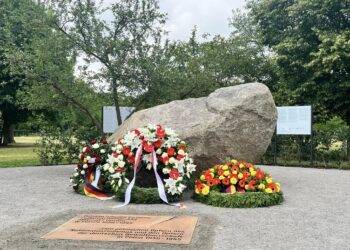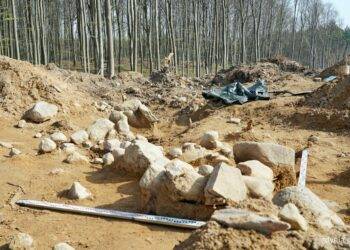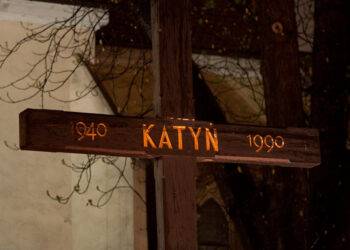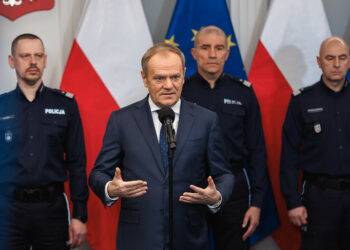During World War II, amidst the chaos of the Battle of Britain, the 303 Polish Squadron emerged as an extraordinary force in the skies. We will delve into the remarkable journey of these Polish aviators, highlighting their resilience, heroism, and immense contribution to the Allied victory. From their initial skepticism to their ultimate triumph, the 303 Polish Squadron’s story is one of determination against all odds.
- More News from Poland on our Homepage.
- Sign up to our Newsletter to receive a weekly recap and stay informed about current events in Poland
- Don’t forget to follow us on Facebook.
The Battle of Britain was a pivotal air campaign that raged from July to October 1940. The German Luftwaffe launched a relentless aerial offensive, aiming to pave the way for a full-scale invasion of the British Isles. Their objectives included the destruction of the Royal Air Force (RAF), establishing air superiority over England, disrupting British communication routes, and crippling the nation’s war production and economy.
Initially, the British authorities held reservations about the capabilities of the Polish pilots. They believed that these men, flying outdated planes and lacking English language skills, were remnants of a defeated army. Marshal Hugh Dowding, the officer commanding RAF during the Battle of Britain, even expressed his doubts in a confidential report to the British Ministry of Aviation.
Polish Fighter Pilots Enter the Fray
However, the tide turned when the German Luftwaffe intensified its attacks on England. Desperate for support, the British aviation authorities decided to involve the Polish pilots in the fight against the Germans. Several Polish fighter planes were put to the test to assess their performance. Within days, these pilots became instructors for their British counterparts, demonstrating their skill and prowess.
On August 2, 1940, the 303 Polish Squadron was officially established. Major Zdzisław Krasnodębski became the unit’s commander, with Lieutenant Colonel Witold Urbanowicz as his deputy. Although there was a dual command structure, the British officer appointed by the RAF held the decisive voice.
The Triumphs
The 303 Polish Squadron made its combat debut on August 31, 1940, achieving a resounding victory by downing six enemy aircraft without suffering any losses of their own. This success was just the beginning of their extraordinary accomplishments. Throughout the Battle of Britain, these brave Polish pilots shot down over 200 enemy planes, significantly contributing to the ultimate defeat of the German Luftwaffe.
The heroics of the 303 Polish Squadron were immortalized in the book “Dywizjon 303” (Squadron 303) written by the renowned Polish traveler, Arkady Fiedler. First published in England in 1940, it became a bestseller and garnered multiple reprints, including clandestine editions. The book was released in Poland six years later, further solidifying the squadron’s legendary status.
By the end of the Battle of Britain, the German Luftwaffe had suffered heavy losses, with 1,733 aircraft destroyed and around 650 damaged, accounting for 52% of their forces. The human toll included 2,500 fatalities and captured personnel, along with 1,000 injured airmen. In comparison, the British lost 915 aircraft, with approximately 450 sustaining damage. They mourned the loss of 544 pilots and the injuries of 500 others. The Battle of Britain culminated in the defeat of the Germans on October 31, 1940.
Recognition and Legacy
The 303 Polish Squadron was one of four Polish squadrons that fought in the Battle of Britain, alongside the 300th, 301st, and 302nd bomber squadrons. In total, 144 Polish pilots participated in the battle, achieving extraordinary feats that brought honor to their homeland. The valor and skill of these aviators became a source of inspiration for generations to come.
Winston Churchill, the British Prime Minister, paid tribute to the Polish contribution, stating, “Never in the field of human conflict was so much owed by so many to so few.” These words immortalized the bravery of the Polish pilots and their pivotal role in the defense of Britain.
Sadly, the recognition and appreciation for the Polish forces were not consistent in the aftermath of World War II. On June 8, 1946, a grand victory parade took place in London, but it noticeably lacked the presence of the Polish soldiers. Only the members of the 303 Polish Squadron were invited, and that too shortly before the event. The Polish Armed Forces, one of the largest national formations fighting against the Nazis, were excluded. Despite their significant contributions, the Polish soldiers were denied the opportunity to march alongside their comrades from other Allied nations.
In a gesture of solidarity, the pilots of the 303 Polish Squadron declined to participate in the parade. As a result, the London parade included representatives from various countries such as Czechoslovakia, Belgium, Brazil, Mexico, and even veterans from Iran and Fiji. However, the absence of Polish soldiers remained a poignant reminder of the overshadowed role they played in the war.
The remarkable story of the 303 Polish Squadron is a testament to the indomitable spirit and unwavering courage of these Polish aviators. Despite initial doubts, they proved themselves to be extraordinary aerial warriors, contributing significantly to the Allied victory in the Battle of Britain. Their heroism deserves to be celebrated, and their legacy serves as a reminder of the sacrifice and determination exhibited by all those who fought for freedom during World War II.
By retelling the tale of the 303 Polish Squadron, we honor their memory and ensure that their extraordinary feats continue to inspire future generations.
- Thank you for reading the article – we’re glad you are with us.
- Follow us on Facebook and Twitter to stay up to date with News from Poland.
- For the most beautiful pictures of Poland – follow us on Instagram.

